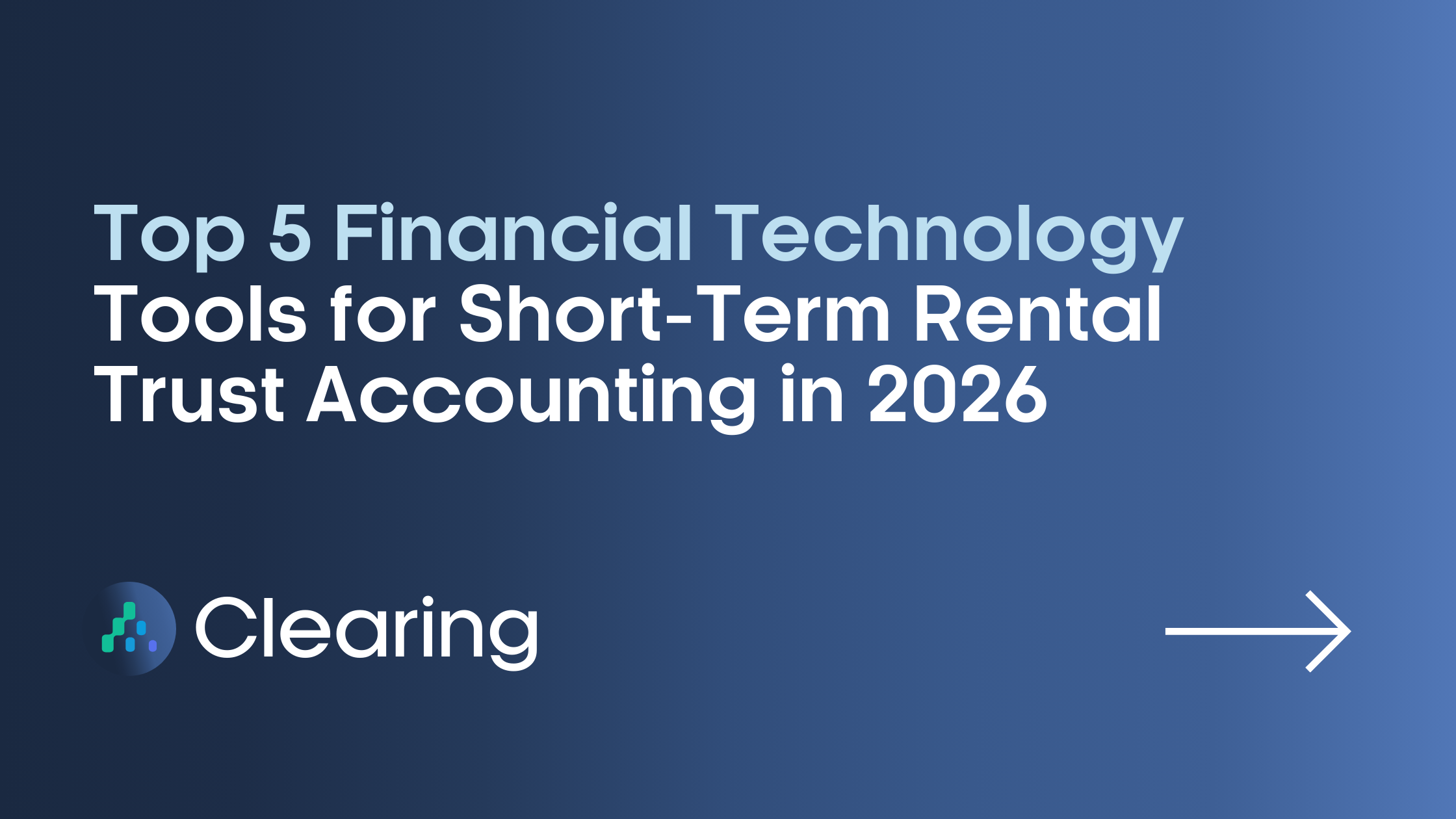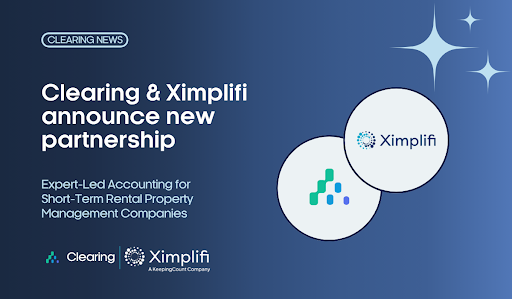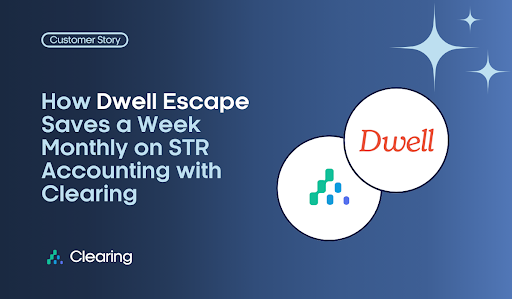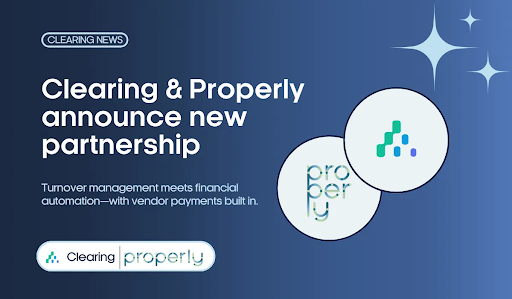Trust Accounting for your Rental Property Business
Discover the full potential of Trust Accounting for your rental real estate property. Learn how trust accounting safeguards financial transactions, enhances transparency, and prevents fraud. Explore Clearing's innovative platform to enhance financial management, transparency, and compliance in real estate rentals.
September 29, 2023
Corey
%20(1).png)
When it comes to renting real estate, it is crucial to manage finances accurately. Trust accounting ensures the integrity of financial transactions and protects the interest of property owners and managers.
Trust accounting serves as the vigilant guardian of the rental property's financial health. It ensures that every dollar, whether a guest's deposit or the actual rental income, is meticulously tracked and allocated. Trust accounting helps create a clear and responsible process. It prevents errors, and fraud, and ensures legal compliance.

In this blog, we will explore trust accounting for rental property businesses. Specifically, we will focus on vacation rental and Short-Term Rental trust accounting.
Fundamentals of Trust Accounting

In property rental businesses, trust accounting means setting up separate accounts for funds. These accounts hold money for different rental properties and owners. The primary purpose of trust accounting is to ensure the proper handling and management of financial transactions related to these properties. To manage the finances of each property separately, keep a clear record of its income, expenses, and other financial activities.
Trust accounting protects money by separating funds, keeping good records, and promoting transaction transparency. It helps track money, report trustee finances accurately, and reduce risks of mixing funds and beneficiaries.
Key Elements of Trust Accounting for Rental Properties
Segregated Trust Accounts
At the heart of trust accounting is segregated trust accounts, which are distinct bank accounts established for the sole purpose of holding funds for specific rental properties. These accounts act as financial repositories for rental income, deposits, maintenance expenses, and other related transactions. Segregated accounts ensure that the financial activities and assets of each property remain separate and distinct, reducing the potential for errors, discrepancies, and confusion.
Recognizing Transactions Appropriately
Trust accounting also involves the ability to collect booking reservation revenue, but hold it in trust till the booking is actually started or completed. Having the ability to hold funds in case a refund needs to be processed is key to trust accounting, because this means that the money being collected (which isn’t all yours) is safe and accounted for at all times. Whether these transactions are recognized when they hit the books, or when the reservation actually starts is up to the property manager, but the money should be kept separate from the operating account if the funds won’t be recognized till the booking is complete.
Compliance and Legal Implications
Trust accounting is not just a best practice; it often carries legal and regulatory implications. Many jurisdictions require property managers to maintain detailed records and adhere to trust accounting principles to handle owner funds properly. Failure to comply with these regulations can result in penalties, legal disputes, and damage to your reputation. By maintaining accurate and segregated trust accounts, property managers can demonstrate their commitment to financial integrity and regulatory compliance.
Benefits of Trust Accounting for Short-Term Vacation Rentals

Trust accounting offers a plethora of advantages when applied to short-term vacation rentals. These benefits extend beyond mere financial organization, and significantly impact transparency, risk management, and owner relationships.
1. Transparency and Accountability
Transparency is the bedrock upon which trust is built in any business relationship. Trust accounting introduces a new level of transparency into the financial interactions between property managers, property owners, and guests. Through dedicated trust accounts for each property, the flow of funds becomes readily visible, allowing all parties involved to maintain accurate records and trace the movement of money with ease. This transparency enhances accountability as property managers can provide precise and detailed financial reports, fostering open communication and establishing trust between property owners and property managers.
2. Accurate Financial Tracking and Record-Keeping
In the dynamic landscape of short-term vacation rentals, accurate financial tracking and accurate records is of paramount importance. Trust accounting ensures that every financial transaction, whether a reservation payment, deposit, or maintenance expense, is meticulously recorded and categorized. This level of detail empowers property managers with the ability to generate comprehensive financial statements, balance sheets, profit & loss statements, and income reports per individual property. Such reports offer invaluable insights into the financial health of each rental property, enabling informed decisions and strategic planning.
3. Risk Mitigation and Fraud Prevention
Short-term vacation rentals can expose property managers to unique financial risks. Trust accounting acts as a safeguard against these risks by maintaining a clear separation between owner funds and operational funds. This separation mitigates the potential for commingling or misappropriation of client funds, reducing the risk of financial discrepancies and fraud. Additionally, trust accounting's emphasis on accurate record-keeping provides a reliable audit trail, aiding in detecting and preventing fraudulent activities.
4. Building Owner Confidence and Satisfaction
Trust accounting isn't merely a behind-the-scenes practice—it has a tangible impact on the owner-property manager relationship. When owners are assured that their revenues are held in dedicated accounts, their confidence in the management's professionalism and integrity grows. This enhanced confidence translates to increased owner satisfaction, as owners know their financial interests are being responsibly managed. Ultimately, owners who feel secure in their financial interactions are more likely to renew their contracts with property management businesses, recommend the property management company to others, and maintain a positive relationship with the property manager altogether.
Best Practices for Rental Property Trust Accounting

Sound trust accounting practices serve as the bedrock for effective property management. Adopting a set of best practices is essential to maximize the benefits of trust accounting for your portfolio of short-term vacation rental properties. These practices ensure financial accuracy, transparency, and efficient management, contributing to the overall success of your rental real estate ventures.
Create Dedicated Accounts for Each Property:
Central to effective trust accounting is the establishment of dedicated trust accounts for each of your rental properties. These segregated accounts are specifically earmarked to hold funds related to a particular property. Maintaining separate client trust funds and accounts ensures that financial transactions and balances are property-specific, eliminating any confusion or commingling of funds. This practice promotes transparency and aids in accurate record-keeping and financial reporting.
Ensure Regular Reconciliation and Discrepancy Resolution:
Regular reconciliation is a cornerstone of effective trust accounting. Consistently comparing your trust account records with your bank account statements helps identify any discrepancies promptly. This proactive approach allows for the timely resolution of issues, ensuring the accuracy of your financial records. Regular reconciliation also mitigates the risk of fraudulent activities and enhances your ability to detect and address anomalies.
Maintain Comprehensive Documentation and Audit Trails for Each Property:
Thorough documentation and audit trails are key to successful trust accounting. Maintain organized and detailed records for each property including financial transactions, rental agreements, deposit information, and maintenance expenses. This documentation not only aids in compliance with legal and regulatory requirements but also serves as a reliable reference in case of audits or disputes.
Seek Professional Expertise in Trust Accounting:
Navigating the complexities of trust law and accounting may require professional expertise. Engaging the services of a qualified accountant or financial advisor with experience in short-term vacation rentals can provide valuable insights and ensure that your trust accounting practices are aligned with industry standards and regulations.
By implementing these best practices, you can maximize trust account benefits for your rental real estate property.
Future Trends and Innovations in Trust Accounting

In the rapidly evolving landscape of real estate rentals, the practice of trust accounting is poised for transformation through cutting-edge technological advancements and innovative approaches. As we peer into the horizon, we witness a host of future trends and innovations that promise to revolutionize trust accounting for rental properties, particularly in the realm of short-term vacation rentals. These trends not only enhance the efficiency of financial management but also elevate the overall owner-property manager relationship, paving the way for a new era of Short-Term Rental property management.
Integration of Technology and Automation
Technology and automation are set to play a pivotal role in shaping the future of trust accounting. The integration of advanced software solutions and automated platforms streamlines and simplifies complex trust accounting compliance processes. Automated systems enable seamless transaction tracking, instant reconciliation, and real-time updates, minimizing human errors and saving valuable time. These technological advancements empower property managers to allocate their focus toward strategic decision-making and guest satisfaction, rather than complex bookkeeping.
Streamlined Financial Reporting and Analytics
The future of trust accounting holds a promise of data-driven insights and enhanced financial reporting. Advanced analytics tools provide comprehensive views of income, expenses, and property performance, allowing property managers to make informed decisions to optimize their rental operations. Streamlined financial reporting ensures clarity and transparency, enabling property managers to monitor individual rental properties' financial health easily. By leveraging data analytics, property managers can identify trends, forecast future performance, and strategize for growth.
Enhancing Owner Experience through Trust Accounting
Trust accounting directly impacts the owner-property manager relationship. Future trends aim to bridge this gap by enhancing the owner experience through trust accounting practices. The integration of trust accounting software with owner portals allow owners to view their financial interactions in real-time, promoting transparency and reducing disputes. By enhancing the owner experience, trust accounting becomes a tool to attract and retain owner relationships, fostering a positive reputation and increased business demand.
In conclusion, trust accounting stands as the bedrock of sound financial management in the dynamic world of short-term vacation rentals. It ensures that every dollar is meticulously tracked and allocated, fostering transparency, accountability, and compliance. The advantages of trust accounting, particularly in short-term vacation rentals, are evident in its ability to enhance owner relations, prevent fraud, ensure compliance in some real-estate jurisdictions, and provide a clear financial snapshot for each property.
One last thing we forgot to mention… 😀
Embracing innovative solutions like Clearing empowers property managers to navigate the complex landscape of trust accounting with confidence. So, if you’re ready to take your vacation rental property management finances to the next level, we’re here to help!
Discover how Clearing streamlines trust accounting and financial data management, automates reconciliation, simplifies reporting, and ensures transparency, accuracy, and compliance. Don't miss out on the opportunity to revolutionize your rental business’ accounting and record keeping processes.
Request a personalized demo today and see how Clearing can enhance your Short-Term Rental business’ financial management, owner satisfaction, client experience, and overall success.
Clearing is a Financial Technology Company, not a bank.






.png)
.png)
.png)

.png)

.png)


.png)
.png)
.png)
%20(1).png)
%20(1).png)
%20(1).png)
.png)
%20(2).png)
%20(1).png)
%20(1).png)
.png)

.png)
.png)
.png)
%20(1).png)
.png)
.png)
.png)
.png)
.png)
.png)
.png)
%20(1).png)
.png)
.png)
.png)
%20(1).png)
%20(1).png)
%20(1).png)








.jpg)
%20(1).png)
%20(1).png)
%20(2).png)
%20(1).png)

%20(1).png)
%20(1).png)
%20(1).png)



%20(1).png)
%20(1).png)
%20(1).png)
%20(1).png)
%20(1).png)


%20(1).png)
%20(1).png)
%20(1).png)
%20(2).png)
%20(2).png)



%20(2).png)


%20(2).png)
%20(1).png)
.png)


%20(2).png)
%20(2).png)

.jpg)
.png)
.png)
.png)



.png)

.png)